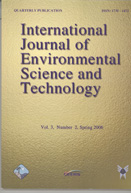
|
International Journal of Environment Science and Technology
Center for Environment and Energy Research and Studies (CEERS)
ISSN: 1735-1472
EISSN: 1735-1472
Vol. 2, No. 2, 2005-2006, pp. 105-111
|
 Bioline Code: st05014
Bioline Code: st05014
Full paper language: English
Document type: Research Article
Document available free of charge
|
|
|
International Journal of Environment Science and Technology, Vol. 2, No. 2, 2005-2006, pp. 105-111
| en |
Effects of aeration rate and detention time on thermophilic aerobic digestion of mixed sludge and its dewaterability
H. Movahedian Attar, B. Bina and Kh. Moeinian
Abstract
Thermophilic aerobic digestion (TAD) is a possible alternative for rapid sludge degradation and producing Class A biosolids. Aeration rate and detention time are two of the important parameters in TAD processes due to rapidly growing thermophilic bacteria population, limited solubility of oxygen at high temperatures and the need to prevent cooling of TAD process. Also the current knowledge and understanding of dewatering TAD biosolids are limited and incompelet.The objectives of this study were to investigate the effects of various aeration rates and detention time on some characteristics of mixed sewage sludge. Four glass-cylindrical digesters with 7 liters of sludge in each, placed in a water bath and were operated at 55 °C with the aeration rates of 2.14, 3.00, 3.86 and 4.71 volume of air per volume of sludge per hours. It was found the increase in aeration rate decreased the required detention time in order to meet the Class A sludge regulations to reduce vector attraction. The values of Oxidation-Reduction Potential (ORP) were changed from negative values to positiv ones and the values of pH were increased from around neutral to slightly basic, but this increases were occured at different detention times. TAD affected dewaterability of mixed sewage sludge and produced biosolids with higher specific resistance to filtration (lower dewaterability) than undigested sludge. Thermophically digested sludge has a good setteling behavior and air drying on sand bed.
Keywords
Sludge processing, thermophilic aerobic digestion, Class A biosolid, oxidation-reduction potential (ORP), sludge dewaterability, specific resistance to filtration (SRF)
|
| |
© Copyright 2005 Center for Environment and Energy Research and Studies (CEERS)
Alternative site location: http://www.ijest.org
|
|
